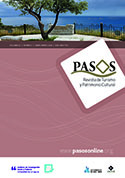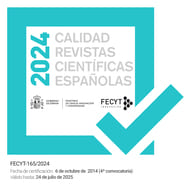Inteligência emocional no Turismo: um estudo sobre os trabalhadores de empresas de foodservice no Sul do Brasil
DOI:
https://doi.org/10.25145/j.pasos.2024.22.006Palavras-chave:
Turismo, Foodservice, Inteligência Emocional, Dimensões da IE, Escala WLEISResumo
O setor de foodservice exige altos níveis de comportamentos emocionais positivos de todos os trabalhadores, especialmente aqueles que interagem diretamente com os consumidores. Por esta razão, a inteligência emocional é uma área de interesse para o foodservice. O objetivo do estudo foi analisar a inteligência emocional (IE) dos trabalhadores de empresas de foodservice nas cidades de Itajaí e Balneário Camboriú, Sul do Brasil. Para tanto foi realizado um survey com uma amostra de 284 respondentes. O instrumento de coleta de dados foi baseado na escala WLEIS. As análises foram realizadas pelos softwares SPSS e SmartPLS. Como resultados viu-se que os funcionários do setor de foodservice demonstram saber usar suas emoções, mas apresentam dificuldades em gerenciá-las. O uso da emoção foi a dimensão da IE que obteve os melhores resultados, e que a dimensão regulação da emoção foi a que obteve as menores médias. Considera-se que a IE é influenciada por variáveis ligadas ao gênero, nível educacional e posição de trabalho. As informações levantadas podem auxiliar no subsídio de programas de treinamento e desenvolvimento para ajudar os funcionários do setor de foodservice.
Downloads
##plugins.generic.pfl.publicationFactsTitle##
##plugins.generic.pfl.reviewerProfiles## Indisp.
##plugins.generic.pfl.authorStatements##
##plugins.generic.pfl.indexedIn##
-
##plugins.generic.pfl.indexedList##
- ##plugins.generic.pfl.academicSociety##
- PASOS. Revista de Turismo y Patrimonio Cultural
- ##plugins.generic.pfl.publisher##
- Instituto Universitario de Investigación Social y Turismo. Universidad de La Laguna (España) - Instituto Universitario da Maia ISMAI (Portugal)
Referências
Aho, O. W. (2020). The link between job satisfaction and the intent to leave among casino employees. Journal of Human Resources in Hospitality & Tourism, 19(4), 417-442.
Bani-Melhem, S., Abukhait, R. M., & Mohd. Shamsudin, F. (2020). Does job stress affect innovative behaviors? Evidence from dubai five-star hotels. Journal of Human Resources in Hospitality & Tourism, 19(3), 344-367
Barrett, L. F., & Satpute, A. B. (2019). Historical pitfalls and new directions in the neuroscience of emotion. Neuroscience letters, 693, 9-18.
de Oliveira, B. S., Lisboa Sohn, A. P., Pontes, N., & Glavas, C. (2022). Emotional intelligence and stress coping style in the foodservice industry in Brazil. Journal of Human Resources in Hospitality & Tourism, 1-27.
Ceribeli, H. B., & Barbosa, R. M. (2019). Análise da Relação entre Suporte Organizacional Percebido, Exaustão e Comprometimento Organizacional. Revista Reuna, 24(3), 1-19.
Ciarrochi, J. V., Chan, A. Y., & Caputi, P. (2000). A critical evaluation of the emotional intelligence construct. Personality and Individual differences, 28(3), 539-561.
Cichy, R. F., Cha, J., & Kim, S. (2007). Private club leaders’ emotional intelligence: Development and validation of a new measure of emotional intelligence. Journal of Hospitality & Tourism Research, 31(1), 39-55.
Choi, H. M., Mohammad, A. A., & Kim, W. G. (2019). Understanding hotel frontline employees’ emotional intelligence, emotional labor, job stress, coping strategies and burnout. International Journal of Hospitality Management, 82, 199-208.
Damasio, A. (2003). Feelings of emotion and the self. Annals of the New York Academy of Sciences, 1001(1), 253-261.
de Freitas, R. S. G., & Stedefeldt, E. (2020). COVID-19 pandemic underlines the need to build resilience in commercial restaurants’ food safety. Food Research International, 136, 109472.
Goffman, E. (1978). The presentation of self in everyday life (p. 56). London: Harmondsworth.
Goleman, D. (1995). Inteligência Emocional: a teoria que redefine o que é ser inteligente. Editora Objetiva: SP.
Goleman, D. (1999). Trabalhando com a inteligência emocional. Objetiva.
Hair, J. F., Black, W. C., Babin, B. J., Anderson, R. E., & Tatham, R. L. (2009). Análise multivariada de dados. Porto Alegre: Bookman editora.
Han, S. J., Kim, W. G., & Kang, S. (2017). Effect of restaurant manager emotional intelligence and support on front-of-house employees’ job satisfaction. International Journal of Contemporary Hospitality Management.
Ho, K. F. W., Ho, K. F., Wong, S. Y., Cheung, A. W., & Yeoh, E. (2020). Workplace safety and coronavirus disease (COVID-19) pandemic: survey of employees. Bulletin of the World Health Organization.
Hofmann, V., & Stokburger-Sauer, N. E. (2017). The impact of emotional labor on employees’ work-life balance perception and commitment: A study in the hospitality industry. International Journal of Hospitality Management, 65, 47-58.
Hur, W. M., Moon, T. W., & Jun, J. K. (2013). The role of perceived organizational support on emotional labor in the airline industry. International Journal of Contemporary Hospitality Management.
Kim, H. J., & Agrusa, J. (2011). Hospitality service employees’ coping styles: The role of emotional intelligence, two basic personality traits, and socio-demographic factors. International Journal of Hospitality Management, 30(3), 588-598.
Kim, K., & Jogaratnam, G. (2010). Effects of individual and organizational factors on job satisfaction and intent to stay in the hotel and restaurant industry. Journal of Human Resources in Hospitality & Tourism, 9(3), 318-339.
Kim, T. T., Yoo, J. J. E., Lee, G., & Kim, J. (2012). Emotional intelligence and emotional labor acting strategies among frontline hotel employees. International Journal of Contemporary Hospitality Management.
Kitayama, S. E., & Markus, H. R. E. (1994). Emotion and culture: Empirical studies of mutual influence (pp. xiii-385). American Psychological Association.
Koc, E., & Boz, H. (2020). Development of hospitality and tourism employees’ emotional intelligence through developing their emotion recognition abilities. Journal of Hospitality Marketing & Management, 29(2), 121-138.
Fedoruk, L., & Lumley, M. (2015). The link between Emotional Intelligence (EI) and cultural dimensions in the context of the micro hospitality sector. Journal of Organisational Studies and Innovation, 2(3), 49-68.
Johanson, M. M., & Woods, R. H. (2008). Recognizing the emotional element in service excellence. Cornell Hospitality Quarterly, 49(3), 310-316.
Jung, H. S., & Yoon, H. H. (2014). Moderating role of hotel employees’ gender and job position on the relationship between emotional intelligence and emotional labor. International Journal of Hospitality Management, 43, 47-52.
Jung, H. S., & Yoon, H. H. (2015). Understanding regulatory focuses: the role of employees’ regulatory focus in stress coping styles, and turnover intent to a five-star hotel. International Journal of Contemporary Hospitality Management.
Jung, H. S., & Yoon, H. H. (2016). Why is employees’ emotional intelligence important? The effects of EI on stress-coping styles and job satisfaction in the hospitality industry. International Journal of Contemporary Hospitality Management.
Lam, L. T., & Kirby, S. L. (2002). Is emotional intelligence an advantage? An exploration of the impact of emotional and general intelligence on individual performance. The journal of social Psychology, 142(1), 133-143.
Langhorn, S. (2004). How emotional intelligence can improve management performance. International Journal of Contemporary Hospitality Management.
Lee, L., & Madera, J. M. (2019). A systematic literature review of emotional labor research from the hospitality and tourism literature. International Journal of Contemporary Hospitality Management.
Liljander, V., & Mattsson, J. (2002). Impact of customer preconsumption mood on the evaluation of employee behavior in service encounters. Psychology & Marketing, 19(10), 837-860.
Lyu, E. S., & Lee, K. A. (2018). The effects of job characteristics on job burnout, engagement and turnover intention of middle and high school foodservice employees. The Korean Journal of Food and Nutrition, 31(1), 70-79.
Luckstead, J., Nayga Jr, R. M., & Snell, H. A. (2021). Labor issues in the food supply chain amid the COVID‐19 pandemic. Applied Economic Perspectives and Policy, 43(1), 382-400.
Mattos, C., & Silva, R. C. (2019). Características da gestão de pessoas e clima para serviços em restaurantes. Revista de Carreiras e Pessoas, 9(1).
Mayer, J. D., & Salovey, P. (1997). What is emotional intelligence. Emotional development and emotional intelligence: Educational implications, 3, 31.
Nadler, R., Carswell, J. J., & Minda, J. P. (2020). Online mindfulness training increases well-being, trait emotional intelligence, and workplace competency ratings: A randomized waitlist-controlled trial. Frontiers in psychology, 11, 255.
Oh, H., & Jang, J. (2020). The role of team-member exchange: Restaurant servers’ emotional intelligence, job performance, and tip size. Journal of Human Resources in Hospitality & Tourism, 19(1), 43-61.
Ramos, H. M., Mustafa, M., Caspersz, D., & Raveentheran, A. (2021). Organizational support and pro-organizational behaviors in hotel family-SMEs: the role of emotional intelligence. Journal of Human Resources in Hospitality & Tourism, 1-23.
Restubog, S. L. D., Ocampo, A. C. G., & Wang, L. (2020). Taking control amidst the chaos: Emotion regulation during the COVID-19 pandemic.
Rodrigues, N., Rebelo, T., & Coelho, J. V. (2011). Adaptação da Escala de Inteligência Emocional de Wong e Law (WLEIS) e análise da sua estrutura factorial e fiabilidade numa amostra portuguesa. Adaptação da Escala de Inteligência Emocional de Wong e Law (WLEIS) e análise da sua estrutura factorial e fiabilidade numa amostra portuguesa, (55), 189-207.
Salcido-Cibrián, L. J., Ramos, N. S., Jiménez, Ó., & Blanca, M. J. (2019). Mindfulness to regulate emotions: The Mindfulness and Emotional Intelligence Program (PINEP) and its adaptation to a virtual learning platform. Complementary therapies in clinical practice, 36, 176-180.
Salovey, P., & Mayer, J. D. (1990). Emotional intelligence. Imagination, cognition and personality, 9(3), 185-211.
Scott-Halsell, S. A., Blum, S. C., & Huffman, L. (2008). A study of emotional intelligence levels in hospitality industry professionals. Journal of Human Resources in Hospitality & Tourism, 7(2), 135-152.
Scott-Halsell, S., Blum, S. C., & Huffman, L. (2011). From school desks to front desks: A comparison of emotional intelligence levels of hospitality undergraduate students to hospitality industry professionals. Journal of Hospitality, Leisure, Sports and Tourism Education (Pre-2012), 10(2), 3.
Shipper, F., Kincaid, J., Rotondo, D. M., & Hoffman, R. C. (2003). A cross‐cultural exploratory study of the linkage between emotional intelligence and managerial effectiveness. The International Journal of Organizational Analysis.
Stoyanova-Bozhkova, S., Paskova, T., & Buhalis, D. (2022). Emotional intelligence: a competitive advantage for tourism and hospitality managers. Tourism Recreation Research, 47(4), 359-371.
Sy, T., Tram, S., & O’hara, L. A. (2006). Relation of employee and manager emotional intelligence to job satisfaction and performance. Journal of vocational behavior, 68(3), 461-473.
Tesone, D. V. (2005). Hospitality Human Resource Management: A Practitioner’s Perspective.
Yurcu, G., & Akinci, Z. (2019). The mediating role of mobbing in the relationship between personal value and depression: A case study of hospitality employees. Journal of Human Resources in Hospitality & Tourism, 18(4), 471-503.
Tsaur, S. H., & Ku, P. S. (2019). The effect of tour leaders’ emotional intelligence on tourists’ consequences. Journal of Travel Research, 58(1), 63-76.
Wolfe, K., & Kim, H. J. (2013). Emotional intelligence, job satisfaction, and job tenure among hotel managers. Journal of Human Resources in Hospitality & Tourism, 12(2), 175-191.
Wong, C. S., & Law, K. S. (2002). The effects of leader and follower emotional intelligence on performance and attitude: An exploratory study. The leadership quarterly, 13(3), 243-274.
Zhao, X., Mattila, A. S., & Ngan, N. N. (2014). The impact of frontline employees’ work–family conflict on customer satisfaction: The mediating role of exhaustion and emotional displays. Cornell Hospitality Quarterly, 55(4), 422-432.
Downloads
Publicado
Como Citar
Edição
Seção
Licença
Copyright (c) 2023 Ana Paula Lisboa Sohn, Bruno Santucci de Oliveira, Nicolas Pontes

Este trabalho está licenciado sob uma licença Creative Commons Attribution-NonCommercial-NoDerivatives 4.0 International License.
Confirmo que o trabalho é original (de minha/nossa autoria), e que não será submetido a outras revistas ou publicações até a resolução final do processo de revisão em PASOS, RTPC.
Autorizo a publicação do meu trabalho por PASOS, PSTN de acesso livre e aberto em qualquer dos formatos que considere oportuno, por tempo indeterminado e como colaboração não remunerada.
Da mesma forma, o(s) autor(es) entende(m) que o trabalho publicado pode ser vinculado ou depositado em qualquer servidor ou incluído em outras publicações (republicação), desde que o novo local e/ou a nova edição façam referência à publicação original e reconheçam a autoria e propriedade de direitos autorais das publicações PASOS RTPC.
Os autores entendem que uma verificação de plágio autoplágio será realizada, e o artigo poderá ser removido a qualquer momento do fluxo editorial.










